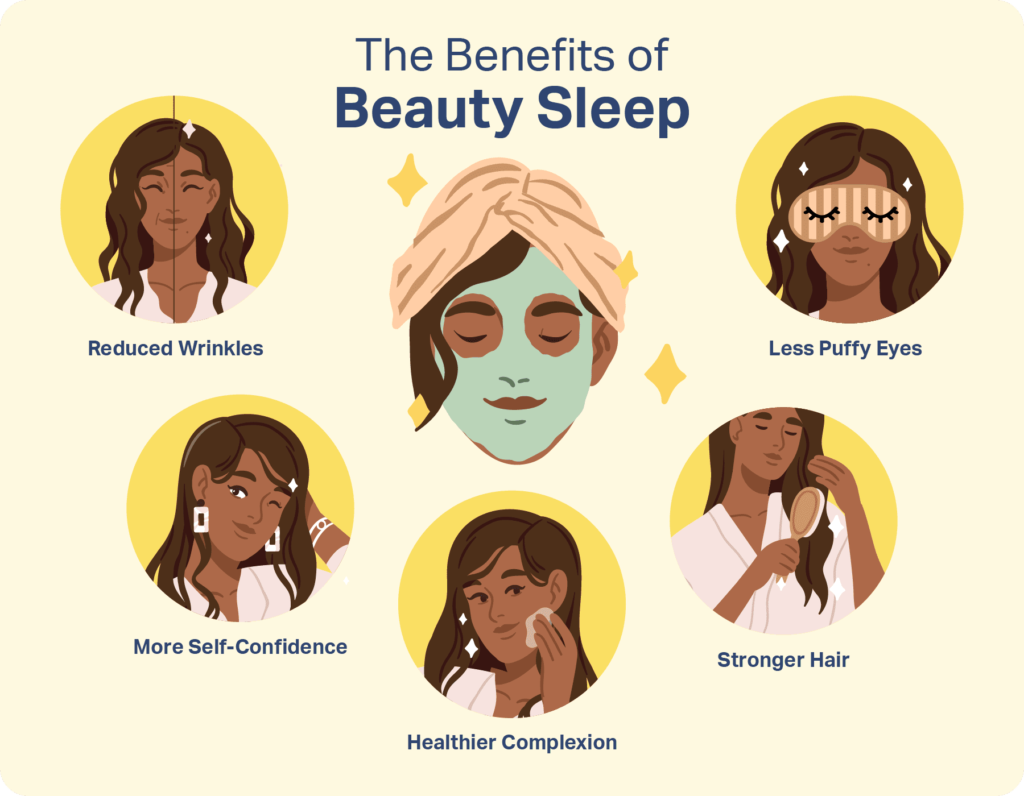In a fast-paced world that celebrates productivity and constant engagement, the importance of a good night’s sleep often takes a back seat. However, sleep is not just a time of rest; it is a crucial period during which our bodies undergo vital processes of repair and rejuvenation. One of the areas profoundly impacted by quality sleep is our skin.
In this blog post, we will explore the intricate relationship between sleep and skin health.

The Science Behind Sleep and Skin Health
While we slumber, our bodies go through various sleep cycles, including deep sleep and rapid eye movement (REM) sleep. These cycles play a pivotal role in regulating our physical and mental well-being. From a skincare perspective, it’s during these restorative phases that our skin cells undergo repair and renewal. Here’s how:
- Cell Regeneration: During deep sleep, the body boosts blood flow to the skin, enhancing the delivery of nutrients and oxygen. This process aids in the repair of damaged cells and tissues, contributing to a more youthful complexion.
- Collagen Production: Collagen is a protein that gives our skin its structure and elasticity. Adequate sleep supports the production of collagen, helping to maintain the skin’s firmness and smoothness.
- Hormonal Balance: Sleep plays a role in regulating the body’s hormonal balance. Growth hormone, which stimulates cell production and regeneration, is released during deep sleep, promoting skin repair.
- Reduced Inflammation: Sleep helps reduce inflammation in the body, including the skin. Inflammation is associated with various skin conditions, such as acne and psoriasis.
- Dark Circles and Puffiness: A lack of sleep can lead to blood vessels under the eyes dilating, resulting in dark circles and puffiness. Quality sleep can help alleviate these signs of fatigue.
Effects of Sleep Deprivation on Skin
Conversely, chronic sleep deprivation can have negative implications for skin health and appearance:
- Premature Aging: Lack of sleep can accelerate the aging process by impairing collagen production and reducing the skin’s ability to repair itself.
- Dull Complexion: Sleep-deprived individuals often experience a lackluster complexion due to poor blood flow, reduced oxygen delivery, and slower cell turnover.
- Wrinkles and Fine Lines: Inadequate sleep can exacerbate the formation of wrinkles and fine lines, making the skin appear tired and aged.
- Skin Sensitivity: Sleep deprivation can lead to increased skin sensitivity and a heightened inflammatory response, exacerbating conditions like eczema and rosacea.
- Acne Aggravation: Sleep disturbances can trigger hormonal imbalances that may worsen acne breakouts.
Prioritizing Sleep for Skin Health
To harness the beauty benefits of sleep, consider the following strategies:
- Establish a Sleep Routine: Go to bed and wake up at consistent times to regulate your body’s internal clock.
- Create a Restful Environment: Make your bedroom conducive to sleep by keeping it dark, quiet, and cool.
- Limit Screen Time: The blue light emitted by electronic devices can disrupt your sleep. Avoid screens at least an hour before bedtime.
- Practice Relaxation Techniques: Engage in relaxation methods such as deep breathing, meditation, or gentle yoga before sleep to calm the mind.
- Monitor Diet and Hydration: Avoid heavy meals and caffeine close to bedtime. Staying hydrated during the day can also contribute to better sleep quality
- Invest in a Comfortable Mattress and Pillows: Your sleep surface plays a significant role in your comfort and quality of sleep.
Tips for Incorporating Sleep into Your Beauty Routine
- Prioritize Sleep: Aim for 7-9 hours of uninterrupted sleep each night. Create a calming bedtime routine to signal to your body that it’s time to wind down.
- Mindfulness and Meditation: Engage in mindfulness practices or meditation to alleviate stress and promote relaxation. These practices can lead to better sleep quality.
- Hydration: Proper hydration supports skin health from the inside out. Drink ample water throughout the day to ensure your skin remains plump and glowing.
- Nutrient-Rich Diet: Consume foods rich in antioxidants, vitamins, and minerals. These nutrients contribute to skin vitality and support its rejuvenation processes.
- Skincare Synergy: Pair your skincare routine with ample rest. Apply nourishing products before bed to maximize their benefits during your skin’s rejuvenation phase.
Sleep is often underestimated as a beauty ritual, but its impact on skin health and appearance is undeniable. Embrace the fact that a good night’s sleep isn’t just a luxury; it’s an investment in your skin’s well-being. By prioritizing sleep and adopting healthy sleep habits, you can unlock the power of your body’s natural rejuvenation processes, revealing a more radiant, youthful, and beautiful complexion that radiates from within. Remember, the real magic happens while you sleep.



